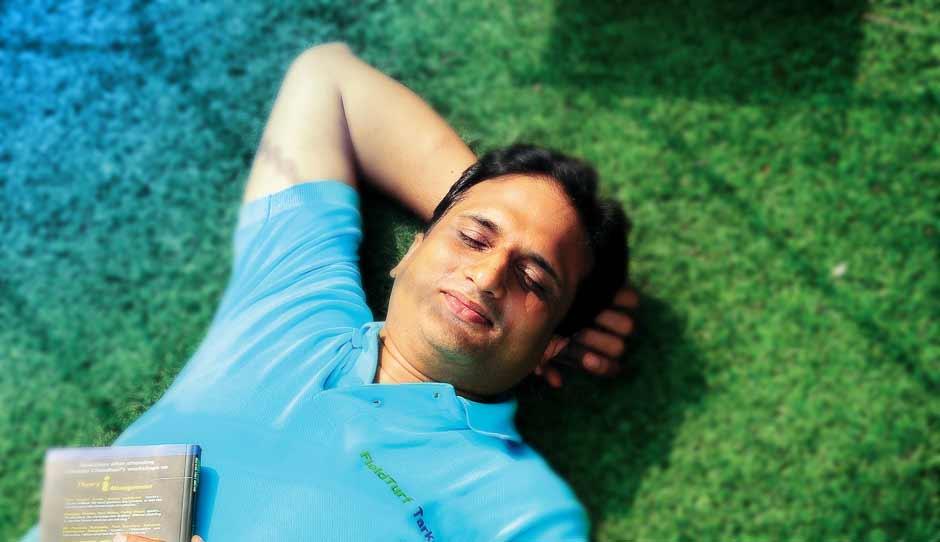How Anil Kumar Played His Way To Success
- BY Shreyasi Singh
 In People
In People 12297
12297 0
0

His family business might be medicine—his parents, brother and sister-in-law are all doctors—but Anil Kumar, founder of Great Sports Infra, an artificial turf grass and sports infrastructure company figured early on that real “business” was more his thing. As a 17-year-old, he wanted to become a franchisee for a large garments brand and even a tyre company. But, his entrepreneurial innings had to wait for several years after. He first got himself some “good to have” attributes—an engineering degree, an MBA and a decade-long corporate career with Ramco Systems. The product that finally lifted his entrepreneurial spirits was not something available in India then. But Kumar sensed in the soothing greens a viable business model. Today, his Rs 15-crore, Hyderabad-based firm greens spaces across India—from home installations of 400 sq ft to 80,000 sq ft football fields in Goa, Sikkim, Mizoram and West Bengal. Even as he spreads across the country, Kumar has managed for himself a work-life split that’s clearly evergreen.
I am not your 20-hour workday kind of guy. I am a sound sleeper and it isn’t unusual for me to manage seven to eight hours of sleep. My day, typically, starts at 6:30am. I use an alarm. But, I don’t think I would sleep much beyond that time even if the beep didn’t go off.
Early morning is definitely “me” time. That’s the only time I spend on myself. I take the time to read the newspaper and exercise, which I do about four times a week. Usually, it’s the treadmill and some weight exercises for around 40 minutes. When I exercise, I like to keep it to just that. My mind is solely on the exercises, not strategising or mulling over business problems.
My wife would like to cook up a nice breakfast for me but I stick to eggs and muesli. Over the last three years, I’ve changed my lifestyle. I’m more conscious of what I eat now. Before that, I’d happily dig into a plate of fried vadas or a six-egg omelette for breakfast. I was a sportsperson throughout my school and college days. Then came a corporate career and the work of building Great Sports Infra, and fitness rules fell by the wayside. But now, with my exercise and breakfast, I’m more on track.
My office begins at 9:30am, but I tend to get down to work by 10:30am. Most of my interactions are with US-based companies so I have a lot of calls to attend at night. Coming in an hour later is a liberty I take. I mostly use my driving time from home to work, a ride of 20 minutes, to make calls.
I hate this e-mail culture of always being connected"—Anil Kumar, Great Sports Infra
Once at work, I go straight to my e-mail. I have a BlackBerry but my e-mail alert is off when I’m not in office. My philosophy is if something was urgent, somebody would call me. My phone is on 24X7 and I make sure I check my text messages. I hate this “e-mail culture” of always being “connected”. I know for sure that nobody died because I didn’t check my e-mail. Once you begin to respond to e-mails at odd hours, people expect you to see the not-urgent ones too. It becomes a way of working. People who work with me know that if an e-mail comes around 7pm or 8pm, I’ll get to it the next day. If it’s important, they are free to call. You can’t be married to your phone. I can’t stand people checking e-mails while watching movies or when they are out in the evening. This is a balance I’ve worked hard to strike. In the first couple of years of building this company, I’d even check e-mails at 4:30am—desperate to see if an inquiry had come in. Once I got more people on board, I made some rules for myself.
I easily tackle over a 100 e-mails a day. At the beginning of the day, it usually takes me a couple of hours responding to queries and setting the direction. The first half of the day is very busy because most decisions get taken then. After that, the day can pan out anyhow. I can’t plan meticulously. I’ve tried to use the calendar many times—on my phone or Microsoft Outlook—but it’s never worked out. Also, a lot of my work isn’t what I initiate. Nearly 70 per cent of my time goes in tackling problems that trickle down to me.
To be honest, nothing stops because of me anymore. I’m only involved in the exceptions, not the routine. A large part of the business just runs on the routine. I wouldn’t know about so many transactions—the shipment, the installation. I only come into the picture during special circumstances, when it’s a particularly large deal or an exceptionally low price.
Over the last two to three years, my focus has been on adding to the product line. We’ve added a wooden sports flooring line and also have a modular sports flooring line. One of the things we’re getting better at is seeing which technologies can be used in the Indian context even if they aren’t intended for that purpose. Our latest launch is such a product. In golf courses in the US, an aerator machine is installed under the grass surface on the course to ensure oxygen is being passed, and the grass grows to a beautiful lushness. We’ve reversed that for India. I’d always wonder why we couldn’t have a technology to dry wet cricket outfields, the cause of so many matches being cancelled. So, on the cricket field this aerator has been tweaked to, in fact, suction water out. The thrill of putting two and two together and making the first deal for the new product is the high I live for. I am not inventing anything maybe, but it’s a smart adaptation. It’s creating a new product, a new market. Like in this, the manufacturer of the aerators had never thought about a cricket field.
Most of my travel now will go into this product. Otherwise, we have a very good distributor network in place. I am happy those days are gone when I’d have to go meet a client or the architect for even a small landscape deal. We’ve done over 2,000 installations across India. I was travelling almost all the time. Now, it’s been cut down to six days a month. I’m thrilled about crunching my travel time. I get much more done sitting in office.
Other than for lunch, which is around 2:30pm for about half an hour, I take no breaks at work. I get a meal packed from home. I hate having to go out and get food. It’s such a waste of time. Lunch is the only time my office door is shut. I eat alone, go online, check Facebook or read newspapers.
Apart from that time alone, I enjoy being with my staff. I think it’s not entirely wrong to say that people management is one of my better skills. I encourage people to take a chance, to make mistakes. I think I’ve a greater tolerance for mistakes than most managers are expected to have. I can confidently say that most people who’ve worked here have added substantially to their ability. Each one of my employees would be absolute assets wherever they go from here. That gives me a lot of pride, to have people here who can stand out in the best companies. We’ve rarely ever sacked a person on a performance issue.
We may be a small company but we’re not ignorant of how large and professional companies work. Our people are thorough professionals, just like team members in the best multinationals. We have a big-company mindset. You can say, it’s part of our DNA—not because we have thousand crore ambitions but because that’s how we want to function. I remember our very first installation. It was a garden for a new house in Bengaluru. It was our first import, and I was unprepared for the hassles in customs and transportation. Nothing came on time. We finally got our delivery at 11pm the night before our clients had organised a huge housewarming party. We went to work at 2am and worked right through till 3pm the next afternoon to instal the garden. I was there throughout because this was the first time we were doing this. All we had were some biscuits and tea to keep us going. And, at 5pm, there were 300 guests on the site. Our clients couldn’t believe a vendor would deliver like that in India. Construction and building vendors are notoriously behind schedule. Looking back today, we couldn’t have had a better start. We set a standard. Those who worked with us knew what was expected of them. Each of my employees works like that even now. They wouldn’t have survived here if they didn’t. We take our time to give a finish date. But, once we’ve made a commitment, it’s non-negotiable. Some of our distributors have told us they’ve picked up this sense of commitment from us. Nothing is more heartening than hearing that.
Between talent and diligence, I’d go for diligence. Talent can be overrated."—Anil Kumar, Great Sports Infra
What I dislike most is writing out reports. I have to motivate myself to do this when Field Turf, US, asks for it. I’m pretty poor when it comes to ratings, metrics and appraisals. I don’t have a system for that. I’m not saying these are necessarily merits. They’re my limitations. To be honest, I love that I’m not data driven. It helps me to think far more freely, more laterally. I don’t think results are the only gauge to judge performance. A star salesman isn’t the one who got the highest sales last month. That could be luck or a seasonal big order. You cannot do with flashes of brilliance. Everyday business doesn’t survive on that. Between talent and diligence, I give higher marks to diligence. Talent can be overrated. It keeps some people in a fairy tale world. My approach is to make the process as professional, compact and thoughtful as possible. This will ensure the results take care of themselves.
Also, I’ve realised a good sale isn’t one where you are always pushing. The best sale is when a customer gets in touch with you. That’s why we never do cold calling. We exhibit at 35 trade shows annually. As the numbers grow, of course, it’s a challenge for me to meet and engage with every customer. So, I’ve put my cell phone number as the contact number on the website and all company brochures. I’ll pass on these inquiries to my team to follow up on but being the first point of contact gives me a good sense of the inquiries coming in.
I also don’t really believe in targets. We had a big event when we reached the 1,000-installation milestone in September 2008. It took us 49 months to get to our first 1,000. We thought we’ll do the next 1,000 in 35 months. But, we actually did it in 21 months. So, I don’t write out mission statements or vision where the company will be. I have little faith in such stuff honestly. In 2008, there’s no way I would’ve known that I’d be selling tools for cricket outfields.
On most weekdays, I head straight back home between 7:30 and 8pm. Once home, I spend time with my two daughters. Cricket is the only thing I watch on TV. I’m a huge cricket buff. Usually, I’ll watch a game of cricket and read a newspaper from my “collection”. I have this odd habit of collecting newspapers that I haven’t read. There are strict instructions at home that no newspaper can be thrown away till I’ve read it. So, if I’m travelling, newspapers from those days will be stacked up. Even now, there are six-month-old newspapers stacked in my house. At some point, I’ll find a way to read them. I don’t care if it’s more than a year-old.
My wife and I also love watching movies—Telugu, Hindi and English films. We prefer that to watching whatever is coming on TV. We usually play something out of our own collection or we rent out DVDs. On some weekends, we manage to go through three or four movies.





























Add new comment